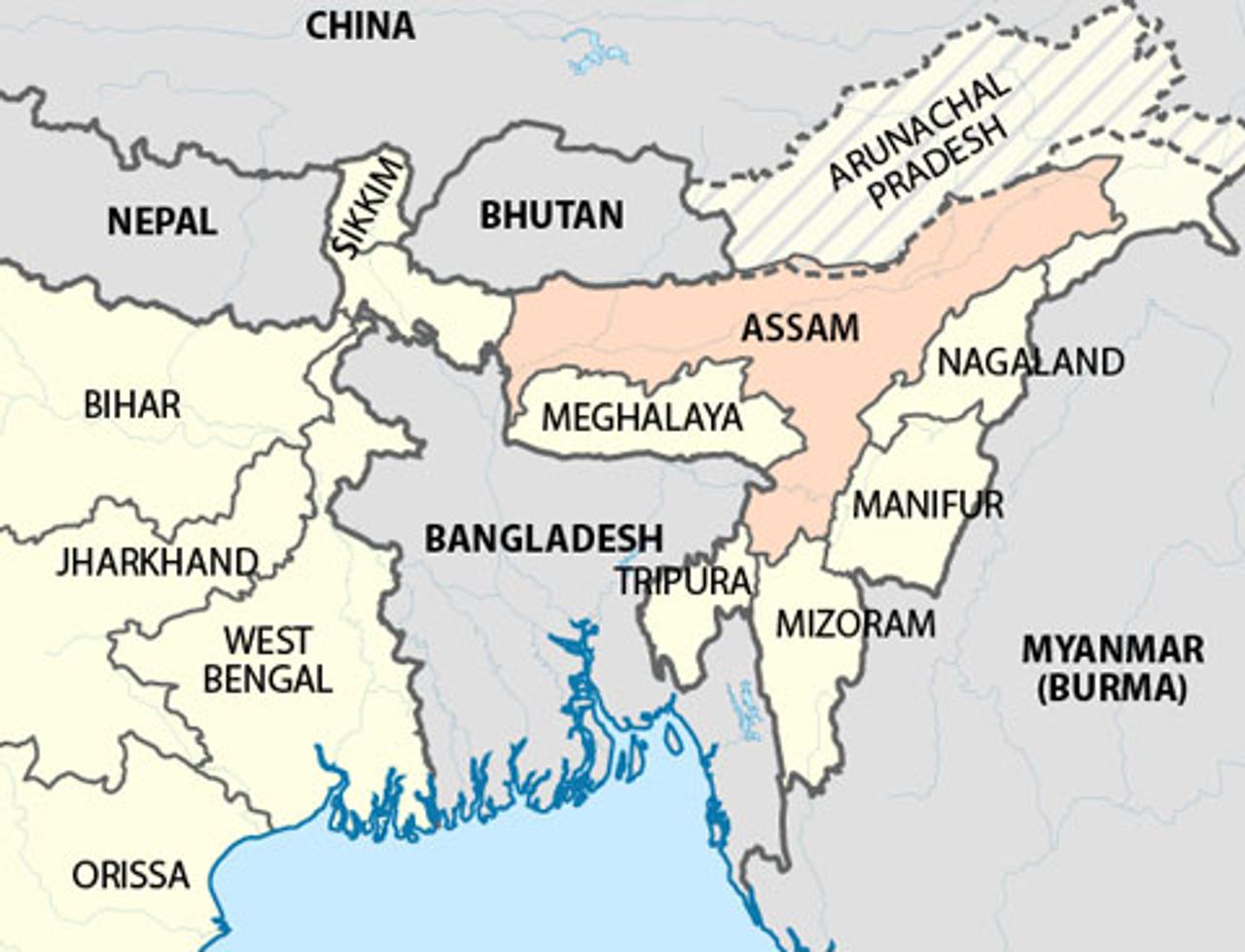Communal riots last week involving Bodo tribesmen and Bengali-speaking Muslims in the eastern Indian state of Assam led to 53 deaths and forced roughly 400,000 people to flee from their homes to refugee camps.
Rival groups from both sides attacked villages, beating people and burning their homes. Clashes started in Kokrajhar district and later spread to Chirang, Bongaigaon and Dhubri districts.
The victims are mostly poor peasant families from both communities. Displaced people in the camps are afraid of returning to their homes. “We are living in fear and we can’t even think about going back to our homes,” one of them told NDTV television.
Clashes between Bodos and Muslims began on May 29 when a local Muslim youth group, the All Bodoland Minority Student Union (ABMSU), called for a general shut down in Kokrajhar to protest the removal of a signboard from a mosque. The Bodoland Territorial Council administration, headed by Hagrama Mohilary, a former Bodo separatist leader, countered by declaring the mosque an illegal structure, and blocked protesters from imposing their shut down.
Eight police officers, a journalist, two tribal employees of the Bodoland secretariat and at least four protestors were injured in the clashes.
On July 6, two Muslim men were shot dead leading to another protest rally by the ABMSU. On July 19, two Muslims, Mohibul Islam, the founder and president of the ABMSU and Abdul Siddique of the All Assam Minority Students Union, were shot dead. The following day, four former members of the separatist Bodoland Liberation Tigers (BLT), were killed. Riots erupted afterwards.
Assam’s Congress-led government of chief minister Tarun Gogoi reacted by deploying state police and demanding central government troops. In response India’s Congress-led United Progressive Alliance (UPA) government sent thousands of troops to affected districts. Gogoi blamed the central government for delay in deploying troops.
An indefinite curfew has been imposed on three districts since July 21; later it was relaxed in Kokrajhar, but for only four hours a day. A “shoot-at-sight” order has been given to security forces against any “violation” of the curfew.
This reaction of the central and state governments underscores their inability to address the causes of the long-standing communal tensions in Assam. Four years ago, similar clashes led to 70 deaths.
 Tensions between Bodo tribesmen and Bengali-speaking Muslims are rooted in the 1947 communal partition of India and the abortion of the democratic revolution. As a part of the 1947 partition of then-British India into a Muslim Pakistan and a Hindu-dominated India, West Bengal became an Indian state, while East Bengal became part of Pakistan. In 1971 it broke from Pakistan to become Bangladesh, which borders Assam.
Tensions between Bodo tribesmen and Bengali-speaking Muslims are rooted in the 1947 communal partition of India and the abortion of the democratic revolution. As a part of the 1947 partition of then-British India into a Muslim Pakistan and a Hindu-dominated India, West Bengal became an Indian state, while East Bengal became part of Pakistan. In 1971 it broke from Pakistan to become Bangladesh, which borders Assam.
The Bodos, like various other tribesmen in north-east India, have been neglected and subjected to continuous repression by the Indian bourgeois state since 1947. They now constitute 10 percent of Assam’s population of 31 million and have ancestral claims to roughly half of its land.
The Indian bourgeoisie’s oppression of the north-east tribes has led to emergence of separatist movements among them, of which the movement for an independent Bodoland is among the most prominent. While exploiting genuine democratic and social demands arising from India’s brutal repression and neglect of the Bodo tribes, the separatists do not provide any progressive alternative for the tribal people.
Their program for an ethnically-defined Bodoland, which would carve out approximately half of Assam as an independent state, represents the interests of a Bodo elite. It wants an enclave to exploit their own working class and various natural resources in the area in a more direct partnership with international capital.
The Bodo-“Bangladeshi” migrant clash arises from these reactionary communalist politics, as rival elites pit impoverished Muslim peasants against similarly impoverished Bodo tribal people.
The All Bodo Students Union (ABSU) and two armed separatist groups—Bodoland Liberation Tigers Force (BLTF) and National Democratic Front of Bodoland (NDFB)—have led the movement for a separate Bodoland state for the past 25 years. The BLTF put down their arms in 2003, entering negotiations with the government. The Bodoland Territorial Council was formed to provide a way for BLTF leaders to join the state ruling apparatus in return for ending their separatist campaign. The ABSU and NDFB continue with their separatist campaign.
These movements’ ethnic exclusivism has led to them to commit communal killings, targeting mainly Bengali-speaking Muslims, while blaming “intruders” from neighbouring Bangladesh.
Indian Prime Minister Manmohan Singh, who represents Assam in the Rajya Sabha, the upper house of India’s national parliament, visited refugee camps in Kokrajhar on Saturday. Stating that it was “a time for healing”, he “promised” a “proper inquiry” into the causes of the violence. He announced a relief package worth only three billion rupees ($US54 million) for the region, however.
The Indian bourgeoisie has started to take an interest in Assam and other north-east states since late 1990,s as a part of its “Look East” policy, which aims to boost India’s economic and political influence in South-East Asian through developing close ties with countries in the region. They consider north-east India as a gateway to South-East Asia.
The main opposition Hindu-supremacist Bharatiya Janatha Party (BJP) has seized on recent communal clashes in Assam to push ahead with its chauvinist campaign against Bengali Muslims in Assam and against Bangladesh immigrants.
BJP general secretary Vijay Goel said: “The [Assam] government did not take appropriate action in time to prevent the Assam violence.... Illegal migrants are behind the problem. But the Tarun Gogoi-led Congress government is not doing anything on the issue.... It is only doing vote bank politics.” He added: “We want the illegal immigrants to be identified and deported.”
